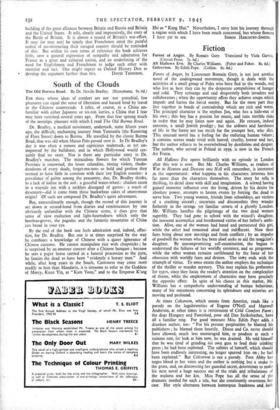South of the Clouds
The Old Burma Road. By Dr. Neville Bradley. (Heinemann. 9s. 6d.)
FOR those whose ideas of comfort are not too parochial, few pleasures can equal the sense of liberation and hazard bred by travel in the Chinese countryside. I refer, of course, to a China unfamiliar with either Japanese or six-ton lorries, a China that I fear may have vanished, several years ago. From that fear sprung much of the nostalgic pleasure with which I read The Old Burma Road.
Dr. Bradley, a medical missionary, undertook, some fifteen years ago, the difficult, enchanting journey from Yunnanfu (the Kunming of Fleet Street) down to Burma. He travelled by the classic Burma Road, that was old when Marco Polo passed over it. In Dr Bradley's day it was often a remote and capricious muletrack, as yet unimproved by the bulldozer, and in which Hollywood would certainly find no story. Nor is there any particular story in Dr. Bradley's marches. The miraculous flowers for which Yunnan Province is renowned, the lesser celandine, rioting violets, rhododendrons of every shade, forget-me-riots so bold and profuse they seemed to have little in common with their coyEnglish cousins: a prevalence of goitre among the peasantry, due, Dr. Bradley thinks, to a lack of iodine in the soil : a graceful water-wheel: chicken eaten in a wayside inn with a reckless disregard of germs: a touch of dysentery—did it come from those buckwheat cakes of anonymous origin? Of such are composed Dr. Bradley's quiet adventures.
But, extraordinarily enough, though the record of this journey is set down at second-hand from diaries and reminiscences by one obviously unfamiliar with the Chinese scene, it does give that sense of slow exaltation and light-heartedness which only the bamboo-groves, the pagodas and the fantastic mountains of China can breed in your eye.
By the end of the book one feels admiration and, indeed, affec:. tion, for Dr. Bradley. But one is at times surprised by the way he combines a knowledge of Chinese with a queer ignorance of Chinese customs. He cannot manipulate rice with chopsticks ; he is surprised by an amateur concert after a Chinese banquet ; because he sees a paper horse carried in a funeral procession to the pyre, he fancies the dead to have been "evidently a horsey man." And while, after long years in the South, Cantonese may come more readily to him than Mandarin, it is tiresome to refer to the Goddess of Mercy, Kuan Yin, as "Kam Yoon," and to the Emperor K'ang
Hsi as "Kang Hui." Nevertheless, I envy him his journey through a region with which I have been much concerned, but whose flowers
I have yet to see. SIMON HARCOURT-SMITH.






















 Previous page
Previous page